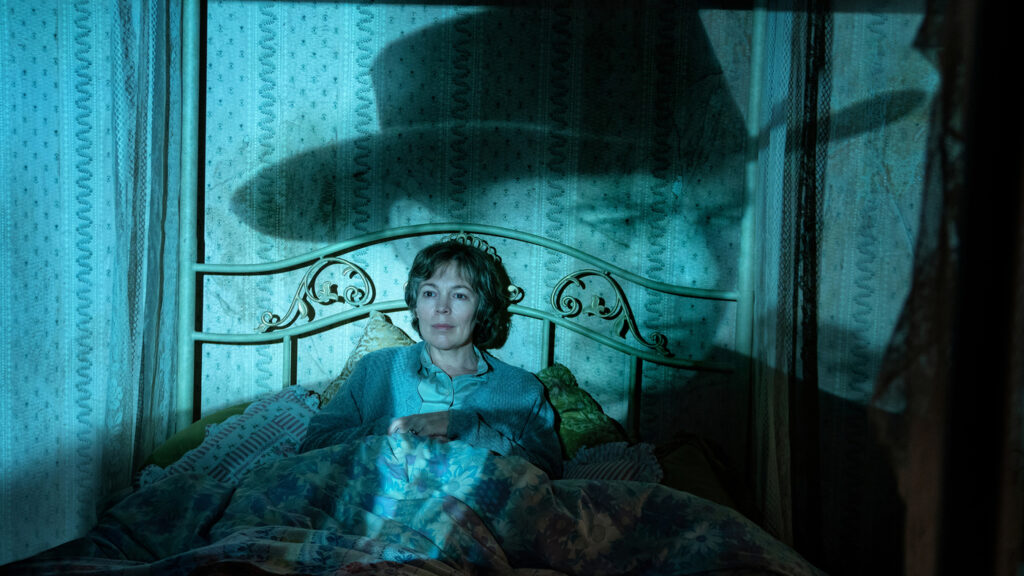
In 1998 Susan Edwards (Olivia Colman) and her husband Christopher (David Thewlis) murdered Susan’s parents and stole £300K from them. They spent this money living abroad in Paris on Hollywood memorabilia and keeping up the illusion that Susan’s parents are still alive until, fifteen years later, they run out of funds. During a phone call to his step-mother to ask for a loan Christopher casually mentions that he buried Susan’s parents in their backyard. A criminal investigation is immediately launched that subsequently resulted in the incarceration of the Edwards despite the fact that, to this very day, they maintain their innocence.
Landscapers (2021) is a true crime mini-series that’s less invested in the details of the double homicide and ensuing fraud than in the relationship between Christopher and Susan. Ed Sinclair’s script reconfigures the police interrogation of these two suspects as a means to reveal their true natures and the dimensions of their marriage. Sinclair’s Landscapers essentially boils down to a story about two lonely misfits who find each other, fall in love and get so caught up in their insular fantasy world that they do a seemingly insane thing and proceed to make countless mistakes in the cover-up.
Susan Edwards is an avid cinephile and momentous Gary Cooper fan. Sinclair’s script exploits this detail and takes it to a formal extreme. Each of the four episodes of Landscapers is aesthetically invested in a single genre or specific movie that in turn reflects the emotional subtext of that episode’s narrative. Episode one gives us a High Noon (1952) pastiche while episode two turns to Truffaut’s The Last Metro (1980). The last two episodes are more genre driven with episode three exploring styles similar to those of Abel Ferrara, Don Segall, and Martin Scorsese while episode four, with the most elaborate narrative structure, boasts a Western genre hybrid akin to Man Of The West (1958) but if it were directed ten years later by Sergio Corbucci.
The links to these specific films comes out of dialogue and visual cues in flashbacks. But these are really intertextual fantasias that appropriate film history to deconstruct the true crime genre whilst simultaneously bringing the viewer literally into the internal life of the two main characters. The cinema for Susan Edwards was a primary coping mechanism for years of abuse at the hands of her father that now repeats itself as she is again traumatized by the police. In Landscapers the cinema and our collective relationship to the films that we see is synonymous with traumatic memory. Memories of trauma can only exist for Susan as memories of cinema.
Will Sharpe, the director of Landscapers, intentionally renders these cinematic memories as blatantly artificial. The wigs, props, lighting, and production design have no pretensions towards realism. The plasticity of these sequences signifies their existence not only as stylized recollections but as intentionally incomplete portraits of emotional distress. The child-like quality inherent to this approach to the material in these segments is at once darkly comic and emotionally shattering. Susan’s naivety and her delusions feel like the desperate reasonings of a child in danger.
At the heart of this dense complex of cinematographic cues are the performances of Colman and Thewlis. Their work in Landscapers is easily the best acting overall in 2021. Their chemistry is so natural and goes so deep that the tenderness with which they interact, even in tense moments, is enough to bring one to tears. These are two tour de force performances that imbue a technically complicated structure with enough raw emotional truth to rival the most gut wrenching pictures that John Cassavetes ever made.
